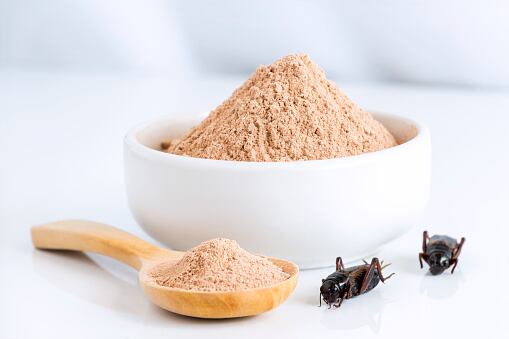Climate change has made predicting food quantities increasingly challenging, especially in light of a rising world population expected to worsen food insecurity. This has led to the introduction of alternative food sources to substitute livestock demands, one of which is edible insects like crickets, which have proven to be a favourite in countries like Thailand.
To determine the health benefits of edible crickets on a molecular basis, as well as their safety and allergenicity, the researchers conducted a review of research articles and books gathered from various scientific databases, including PubMed, ScienceDirect and Scopus.
Does this bug you?
The review found that edible crickets were high in protein, amino acids, and saturated and unsaturated fatty acids, with varying levels of each in different species; the review covered four commonly consumed species in Thailand — A. domesticus, B. portentosus, and the two field crickets G. bimaculatus and Gryllus testaceus.
In terms of health benefits, edible crickets were found to present antioxidant, anti-inflammatory, anti-diabetic and anti-obesity properties. G. bimaculatus, for instance, has been studied extensively both in vitro and in vivo due to its abundant availability.
Treating varicocele-induced male rats with fine powder of this cricket species resulted in low levels of testicular pro-inflammatory cytokines TNF-α and IL-6, compared to the control group. The ethanolic extract of G. bimaculatus, on the other hand, reduced the pro-inflammatory cytokine IL-1β in liver Kupffer cells of mice treated with alcohol.
Data also showed that finely powdered G. bimaculatus 'rescued glucose and insulin tolerance in a dose-dependent fashion' in type 1 diabetic rats. Another study found that the same cricket species prevented streptozotocin-induced pancreatic damage and protected pancreatic β-cell function.
Both A. domesticus and G. bimatculatus displayed anti-obesity properties; the former reduced pancreatic lipase in vitro while the latter led to lower fat weight, lower body weight, decreased intestinal adipose tissue and lower cholesterol in high fat-treated rats.
Other health benefits of edible crickets mentioned in the review included anti-ageing properties, improved gut microbiota, and lower hypertension and high blood pressure risk.
Seafood concern
The review also looked at the safety and allergenicity of edible crickets. Seafood allergies are common and characterised by type I hypersensitivity or IgE-mediated hypersensitivity, often involving arthropods such as shrimp and crab. Crickets are also classified as arthropods and as such, possess potential allergenicity.
There have been cases of insect allergies reported in China and Thailand, 'together with cross-reactivity between A. domesticus, shrimp and house dust mites'. The IgE from patients allergic to shrimp or house dust mites 'can recognize A. domesticus protein, confirming the potential allergenicity of crickets'. Furthermore, cross-reactivity of G. bimaculatus and shrimp has been demonstrated.
Concluding with caution
The review concluded that as crickets were a source of high protein, they could be used to 'treat protein-energy malnutrition diseases such as marasmus and kwashiorkor'. The derived product of crickets also had anti-oxidative and anti-inflammatory properties to 'treat diabetes and arthritis, respectively'.
However, the review also acknowledged that the 'manufacturing process development is still a major challenge in the production and industrialisation of insect-based products', and there should be a focus on research 'highlighting the implementation of technology and process innovation for cricket farming and processing'.
Source: International Journal of Molecular Sciences
https://doi.org/10.3390/ijms23031801
“Road to the Red Carpet of Edible Crickets through Integration into the Human Food Chain with Biofunctions and Sustainability: A Review”
Authors: Varongsiri Kemsawasd, et al.




